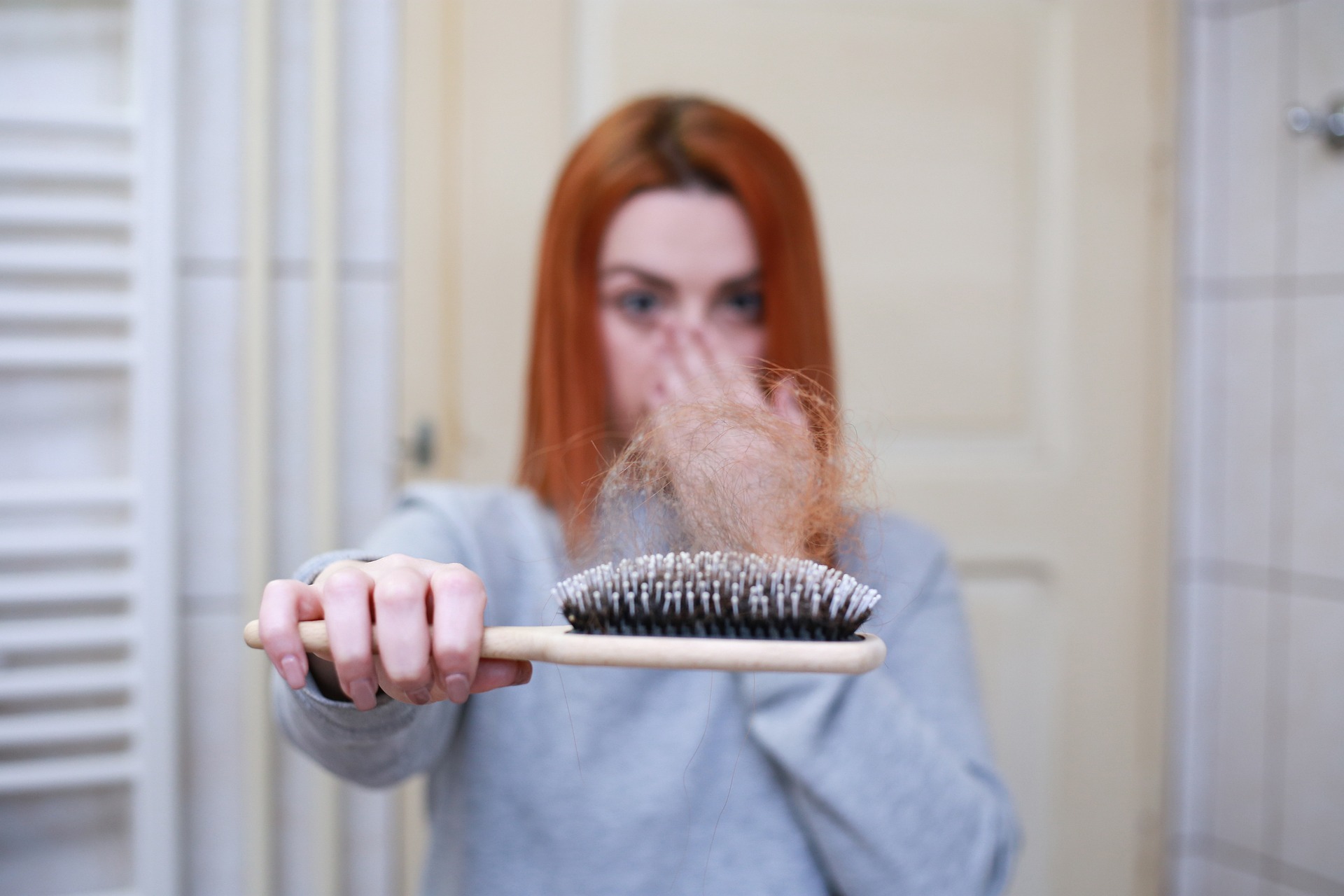11 Potential Causes of Hair Loss and Baldness
Hair loss — whether baldness or noticeably thinning hair — can happen for various reasons. Sometimes hair loss is a side effect of a health problem that needs to be addressed and will remedy itself when the health problem is properly treated. If you're dealing with thinning hair or baldness, it’s important to see a dermatologist to get to the root of the problem and figure out how to stop hair loss or renew growth.
1. Hormonal Imbalances
“Excess androgens, or male sex hormones, and hormonal imbalances are the most common cause of hair loss such as androgenetic alopecia,” says Michele Green, MD, a cosmetic dermatologist in New York City. Androgens play a role in female and male pattern baldness.
In female-pattern baldness, androgens can cause weak hair follicles, also leading to excess shedding. Dr. Green explains that androgen sensitivities may be exacerbated during estrogen-related changes, such as birth control use or menopause.
Male pattern baldness, on the other hand, is related to an increase in an androgen called dihydrotestosterone (DHT). Green says DHT not only binds to hair follicles and stops hair growth, but it may also decrease a hair’s life span overall. This is also called androgenetic alopecia.
MedlinePlus identifies a number of additional medical conditions that may cause this type of hair loss. These include high blood pressure, heart disease, prostate cancer, and polycystic ovary syndrome (PCOS).
2. Thyroid Problems
Other types of hormone-related conditions may also contribute to hair loss. Some may involve thyroid hormones.
Either an underactive thyroid (a medical condition called hypothyroidism), or an overactive thyroid (hyperthyroidism), can result in hair loss because each condition causes a hormonal imbalance. Autoimmune diseases of the thyroid gland, such as Hashimoto’s thyroiditis and Graves’ disease may also contribute to hair loss, explains the Cleveland Clinic.
Top StoriesREAD MOREStop Menopausal Weight Gain and Slim YourMid-Section With These Strategies | Everyday Health
Thyroid hormones help regulate nearly every function in the body, including hair growth. The right treatment to control either of these thyroid conditions will get hormones under control, stop hair loss, and allow your hair to starting grow back.
3. Pregnancy
Other hormonal imbalances can also lead to hair loss, especially the wildly fluctuating hormones that happen following pregnancy and childbirth.
“Postpartum hair loss is common and affects 40 to 50 percent of women who have recently given birth,” explains Green.
Estrogen levels skyrocket during pregnancy, which can temporarily alter your hair growth cycles. During this time, you’re likely to experience less hair loss than normal.
As estrogen levels return to normal after pregnancy, you may notice more hair loss than usual. It’s also not uncommon for postpartum moms to notice thinning hair or even patches of baldness. According to the Cleveland Clinic, postpartum hair loss may happen one to six months after childbirth, with symptoms lasting up to 18 months.
“Because not all hair follicles in the resting stage during pregnancy will move into the shedding phase at once, excessive shedding can last 6 to 15 months postpartum,” says Green. She also notes that postpartum related hair loss is most noticeable along the hairline, as well as in women with long hair.
As the rest of your body recovers, so will your hair follicles. The hair loss is only temporary — your hair will grow back. While postpartum hair loss isn’t exactly preventable, you can minimize the problem by taking it easy on your hair and keeping up with your prenatal vitamins.
4. Certain Medications
According to the American Hair Loss Association, hair loss is a side effect of a number of medications taken for common health problems. This is also known as “drug-induced hair loss.”
Blood-thinning medications, oral contraceptives, drugs for depression, anti-inflammatories, and beta and calcium channel blockers can all lead to thinning hair or baldness. Too much vitamin A and vitamin A–based drugs called retinoids can cause hair loss as well. Some chemotherapy drugs used to treat cancer are known to cause total hair loss as they work to destroy cancer cells.
Just as hair usually grows back after chemo, it should also grow back once you stop taking any medication that causes hair loss. But don't stop taking prescribed medications without talking to a doctor first — he or she may instead shift you to a different drug to see if hair loss improves.
5. Various Types of Alopecia Areata (AA)
Alopecia is the medical term for hair loss, and alopecia areata describes an autoimmune condition in which your immune system attacks and destroys your hair follicles, inhibiting the growth of new hair.
Depending on the type of AA, hair loss may happen only on the scalp or all over the body. According to the American Academy of Dermatology Association, this autoimmune condition may result in thinning hair, patches of hair loss, some balding, or total baldness, and it may be permanent or temporary. There are numerous causes, including genetics. Talk to your doctor about possible treatments.
6. Other Autoimmune Diseases
Alopecia areata is just one of many types of autoimmune diseases that can cause hair loss. Hashimoto’s thyroiditis and lupus are two examples of other autoimmune diseases that can result in hair loss, according to DermNet NZ. This type of hair loss may not always be reversible — it may sometimes be permanent. But medications and hair restoration surgeries may help compensate for any hair loss.
When you have one autoimmune disease, you’re at risk for developing others. This is why it’s especially important for your doctor to monitor you carefully for any new symptoms or other changes.
7. Physical Trauma
When your body is under serious physical stress, the natural cycle of hair growth and rest can be disrupted, resulting in hair loss, often in the form of thinning hair — your hair may even come out in clumps. Any shock to the system, such as a severe accident, surgery, burns, or serious illness, can also shock the hair follicles.
According to Penn Medicine, this may result in up to 50 to 75 percent of your hair falling out, sometimes months after the fact. This type of hair loss is also known as telogen effluvium, and it may resolve within six to eight months.
Infections and illnesses can also lead to hair loss. A high fever or a severe infection can all contribute to temporary hair loss. These physical traumas may include fungal skin infections, as well as bacterial infections like syphilis, which can all be responsible for balding or thinning hair.
Treatment of the underlying infection can restore hair growth and prevent future hair loss, so your first step is to seek medical attention for the primary health problem.
8. Stress
“Hair loss can be triggered by an intense amount of stress, such as developing an illness or undergoing surgery that puts stress on the body and mind,” says Green. “Many experience acute telogen effluvium, in which up to 70 percent of hair follicles go into a resting (telogen) state compared to the estimated 10 to 20 percent of hair follicles normally in the telogen state.”
For instance, in the case of COVID-19, you may be surprised to learn that stress, rather than the disease itself, can cause hair loss, according to the AAD. The organization notes that hair loss is also typical after a fever or during recovery from illness in general.
Emotional trauma can cause acute telogen effluvium, according to Penn Medicine. When you're dealing with a life-altering event, like a divorce or a breakup, bankruptcy or other financial problems, the loss of a home, or the death of a loved one, significant emotional stress can disrupt the normal cycle of hair growth. Usually this type of hair loss is temporary, and once stress is brought under control, normal hair growth is usually restored.
“Hair loss after a stressful event commonly occurs within three to six months,” says Green. To help support hair growth in this case, she recommends talking with a dermatologist about treatment options to stimulate hair growth, such as minoxidil (Rogaine) or platelet-rich plasma (PRP) office treatments.
9. Trichotillomania
While stress is often a short-term cause of hair loss, severe stress or anxiety may be associated with hair-pulling disorder, or trichotillomania. Researchers believe this mental health condition is related to obsessive-compulsive disorder and other types of anxiety disorders.
Aside from compulsive hair pulling, other signs of trichotillomania include feeling relief or pleasure after hairs are pulled, as well noticeable patches of hair loss. According to the Mayo Clinic, trichotillomania most often develops between ages 10 and 13, but it’s considered a chronic problem that may improve with treatment.
Also, if you’re dealing with hair loss from other causes and have a history of hair-pulling disorders, it’s possible to experience trichotillomania as a stress response.
If you suspect you may have this mental health condition, there are treatments that can help, such as cognitive behavioral therapy and habit reversal training, notes the Mayo Clinic. These types of therapies can help you be more cognizant of urges to pull your hair, and help you develop other coping mechanisms instead. Additionally, while no medications are approved for trichotillomania alone, certain antidepressants or antipsychotics may help.
10. Nutrient Deficiencies
“Deficiencies in certain vitamins and minerals can lead to hair loss and diminished hair growth because they aid in the hair growth cycle and cellular turnover,” says Green.
Examples of vitamin deficiencies that can cause hair loss include inadequate protein, biotin, zinc, and iron, according to the AAD.
The essential vitamins and nutrients, like protein, that you get from a healthy, varied, and well-balanced diet ensure good health all throughout your body, making sure all your organs and internal systems are working just as they should. Poor nutrition or severely restrictive crash or fad diets can lead to all kinds of nutrient deficiencies, which in turn can result in hair loss, from thinning hair to patches of baldness.
But before you reach for over-the-counter supplements to treat any suspected deficiencies, talk with your doctor about lab testing to see if you truly are deficient in any nutrients, to prevent overdose. Current research, such as a study published in the January 2017 Dermatology Practical and Conceptual, doesn’t support the use of dietary supplements for individuals without nutritional deficiencies.
Furthermore, while Green recommends incorporating fatty fish, berries, leafy greens, and other foods that may promote healthy hair growth into your diet, she also notes that even a healthy diet can have its limitations.
“Hair loss typically has a genetic factor and can develop even if preventive measures are taken through a healthy, well-balanced diet,” she says.
It’s important to check with a doctor before you take any supplements, because overdoing certain nutrients, such as vitamins A and E, may induce hair loss, Green explains.
11. Extreme Hair Care
In an effort to create a stylish hairdo, you can actually cause significant damage and breakage, which could result in hair loss and thinning hair, per the American Academy of Dermatology Association. Shampooing or blow-drying too frequently, repeatedly using heated styling tools, pulling on hair — whether while blow-drying it or styling it in a too-tight ponytail, for instance — or too vigorously rubbing the scalp can all lead to hair loss. Perms, relaxers, and hair dyes may also contribute to damage-induced hair loss.
“Seek out shampoos and conditioners that are mild and suited for your hair to avoid unnecessary damage,” Green recommends.
Source: EverydayHealth - USA


